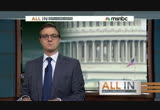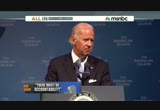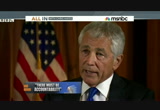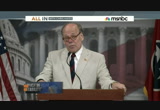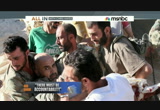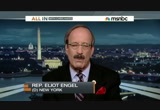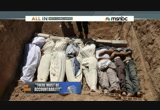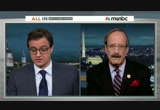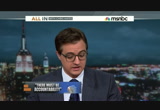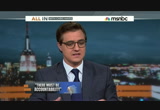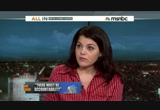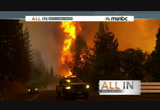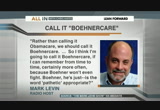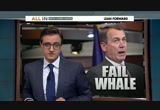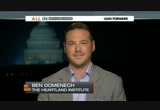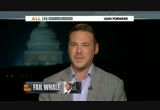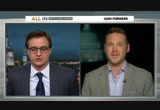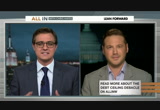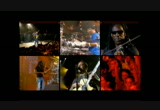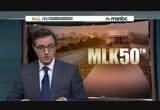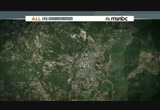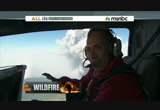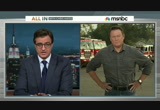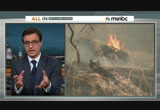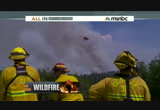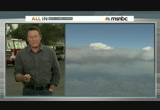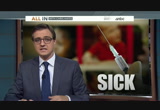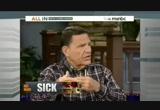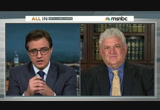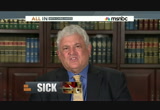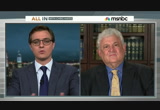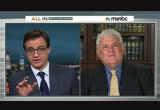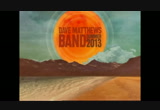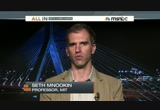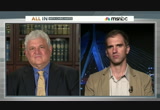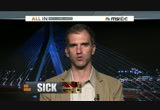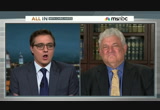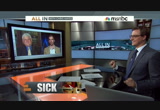tv All In With Chris Hayes MSNBC August 28, 2013 12:00am-1:01am PDT
12:00 am
enemies of this country's economic strength, he'll do what he's determined to do to damascus, make any crossing of his redline a faithful decision for those who dare to do it. that's "hardball" for now. thanks for being with us. "all in with chris hayes" starts right now. > good evening from new york. i'm chris hayes. tonight on "all in" we are told that a u.s. military response in syria is imminent. the u.s. defense secretary says the military is ready to strike. syria's foreign minister says his country is ready to defend itself. what will happen and when? that's coming up in a moment. also tonight, summer vacation is wrapping up for congress, so they're revving up the obstruction machine for a triumphant return to washington in the never-ending west to defund and destroy obama care. plus a texas megachurch
12:01 am
where ministers push faith healing over vaccinations is now at the epicenter of a measles outbreak. why science is being ignored and kids are now paying the price. all that ahead. but we begin tonight with the drumbeat for u.s. military strikes against syria. in just the last 24 hours since we last talked to you, a consensus among the united states and its allies has hardened remarkably quickly and it is apparent there will be military action against syria possibly by the end of the week. >> there's no doubt who is responsible for this heinous use of chemical weapons in syria. the syrian regime. the president believes, and i believe, that those who use chemical weapons against defenseless men, women and children, should and must be held accountable. >> that was, of course, vice president joe biden, who used a previously scheduled speech before the american legion to
12:02 am
make those remarks. at the white house, spokesman jay carney was in day two of setting expectations. >> it is not our policy position to respond to this through regime change. we will take an appropriate response, and we are evaluating, the president and his team are evaluating the options available to them. and the president will make an assessment and an announcement in due time. >> defense secretary chuck hagel made clear that u.s. military forces are ready. >> suffice to say the options are there, the united states department of defense is ready to carry out those options. if that would occur, that would occur also in coordination with our international partners. >> but you're ready to go like that? >> we're ready to go like that.
12:03 am
>> meanwhile, closest allies are lining up in agreement. british prime minister david cameron. >> now, of course, any action we take, or others take, would have to be legal, would have to be proportionate. it would have to be specifically to deter and degrade the future use of chemical weapons. let me stress to people, this is not about getting involved in a middle eastern war or changing our stance in syria or going further into that conflict. it's nothing to do with that. it's about chemical weapons. their use is wrong. and the world shouldn't stand idly by. >> french president francois hollande says the massacre in damascus cannot go without a response. france is prepared to punish those who took the vile decision to gas innocent people. the league stopped short of full agreement on what action should be taken. amid all of this, one thing is certain, the pentagon and other government sources are offering specifics about just what u.s. military action would look like.
12:04 am
>> a minimal number of targets, according to officials we're talking to, against those assets that could be used to deliver chemical weapons such as airplanes, artillery rockets, and no apparent serious regime targets are included in that risks and they believe the strikes could take maybe two to three days to hit all targets they want. >> congressional reaction has been cautious and muddled, while senator chris murphy said on our show last night the president should come to congress here for a vote. there's hardly, of course, consensus on that point. of course, congress is out of session. today congressman steve cohen suggested president obama wait until congress returns on september 9th. then congressman cohen all but dismissed that idea. >> i think we could wait until september the 9th or thereabouts to take action. in many ways, i defer to the president's prerogative and trust the president to do what's right. >> joining me now, congressman eliot engel, democrat from new york, ranking member of the
12:05 am
house foreign affairs committee and has been an advocate of the u.s. intervention in syria. congressman, as best as you can articulate, as someone who i understand supports increased u.s. intervention and military strike here, can you explain to me and our viewers what the concrete mission here, what the concrete goal is of any kind of military action? >> well, i assume the concrete goal, of course, it hasn't been decided to do this. if seems imminent. but i think the goal would be to say to assad and other assads of the world that crimes of this violent nature cannot go unpunished. if we stand by and watch the murder of innocent men, women and children, children gasping for breath and foaming at the mouth and don't take action, i think it encourages other bad players to do the same thing. so i think at the very least, it's saying that you've gone too far, and we're going to make it hard for you to use your air force or weapons to continue to do this. >> if it's to send a message to
12:06 am
assad and other leaders contemplating current or future use of chemical weapons, in the case of assad, is it not true he's currently locked in an absolutely existential fight for his life, his survival and regime's survival, and if he makes the calculation using chemical weapons helps in that, why to we think we can change the set of incentives with two or three days of air strikes when what he's facing on a day-to-day basis is far worse than anything we're planning? >> well, if he's fighting to save his regime, i think there are other ways to fight other than to gas your own people and murder your own people. i think there's -- you know, the president drew a line. i think he was right to say there was a red light, and
12:07 am
beyond that red light, we would take action. i just don't think that the world can sit idly by and watch innocent children be gassed to death. not in the 21st century. they're fighting a civil war. there are other ways to fight it. it's not with the gassing of innocent children. >> let me just say, i mean, i share your and i think any decent person's horror at the images we've seen of children being gassed. absolutely, complete total moral revulsion. it is evil, unquestionably. what, to you, is the principle that separates the death of those innocent children from the 100,000 civilian dead who come before the chemical weapon strike? what is it about that strike that puts it on different terrain than the routine horrific slaughter of innocents that we've seen duration of this civil war? >> well, assad in my estimation has been slaughtering his people
12:08 am
from the start of this war. this is not something new, but the chemical weapons, the use of chemicals is new. and i think that that is just horrific. all deaths are bad. war is bad. but when you turn gas on to your own people, i think that's just going a bit far. and i think the world has a right to express its revulsion. i liken what's happening in syria today to 1999 in kosovo. there you had an endangered population which was being murdered by its own government, and nato intervened with strikes, air strikes, and turned things around. i think you have an endangered population now, and i think assad needs to know that there is a line that he cannot cross, and i think the west is going to show him that line. now, it's not just the united states. it's our nato allies. the arab league today seemed to agree. and i just think that -- >> they seemed to agree the chemical weapons were used by the assad regime but did quite pointedly stop short. in the past, in libya, they explicitly endorsed the u.n. and allied bombing there. congressman eliot engel, democrat from new york.
12:09 am
thank you for your time tonight. >> thank you, chris. >> joining me now, julia ioffe, senior editor at the "new republic" covering this story. had a great write-up today about the thinking in the white house. what struck me here is there's this bizarre kind of goldilocks evaluation being done about what this response looks like, not too strong to tip the balance of the civil war, but not too weak so that it actually means something to assad. what is the thinking about the calculation of what this strike should look like inside the white house? >> well, i think, you know, it's as was once joked, obama is between a rock and a hard place. he's very much haunted by the mistakes of the previous administration that rushed into two wars that have really tired out the country and emptied our coffers. he's not rushing to get into a new one. i think the fact that, for example, that secretary of state
12:10 am
john kerry spoke first, but we haven't heard from president obama yet, is significant. i think he's taking his time, but he also wants to show that he will do something, but it doesn't really make sense. you can't really take the chemical weapons attack out of context here. i mean, it is part of this whole war. so, you know, however many people died in this attack, but as you said yourself, 100,000 people died before using conventional weapons. >> here's one of the things that came across in what you wrote and reported today is that even though the specific responses to a chemical weapons attack, even though prime minister david cameron says the goal has to be to deter the possibility of chemical weapons attacks. it's essentially impossible for us to strike any chemical weapons stashes for the risk of making things worse by blowing up a whole bunch of nerve agents that you then send spiraling into the air. >> well, it's not just that, you destroy the depots and then people can come in and lute them. the containers that aren't exploded. that is really a surefire way to set these things loose on the
12:11 am
world. you don't know where they'll go after that. but in terms of, you know, setting up a sense of consequence, okay, we'll hit him in a few places, we won't hit him too hard so it will be a slap on the wrist so he'll know he can use chemical weapons on a smaller scale, because we haven't punished that before. it doesn't -- i understand the impulse not to get involved in a another war in the middle east. we have egypt next door spiraling out of control. syria has been a mess for three years. but at this point, you either -- i feel like you have to do everything or -- it doesn't make sense to just hit him a little bit. >> julia ioffe from the "new republic." thank you so much. joining us now, tamara alrifai, advocacy and director of middle east human rights watch. she's a native of syria. the head of human rights, kenneth roth, i've been following him on twitter, he has been incredibly strong in condemnations of the behavior of the assad regime, particularly as it pertains to the use of chemical weapons, indiscriminate slaughter of civilians. what's your feeling about the
12:12 am
imminence of this military strike justified quite explicitly on humanitarian grounds as a way of enforcing an international norm human rights and i believe in, which is the prohibition of chemical weapons. >> for us as human rights watch, you do not gas your own people like you just said and everyone's saying. then the effects of this attack will be judged by the sequence of such horrific attacks. we will only be able to judge whether this was successful if we see a real halt to the atrocities conducted over the past -- >> what is your calculation about whether we have either the military capability or the will to do that or whether we can do that in this way being described now there's this single surgical moment of punishment that enforces the norm and then we stop. then we just let them get back to the civil war.
12:13 am
>> it's a very complex situation that's witnessed so many abuses. this is not the first abuse human rights watch has documented. been going on and on including the use of missiles and many kinds of arms that cannot distinguish between civilians and competence, anyway. now, what will come out of this particular attack if it happens is just speculation today. >> okay, but that is exactly the speculation that anyone engaged in this policy has to deal with. what do you say to the congressman, congressman eliot engel who makes the argument those in support of intervention have made, been making a while now, which is the world cannot sit idly by and watch such atrocities? as someone from human rights watch, how do you respond to that? >> we have not advocating for or against the intervention. if the intervention really is to happen, which is looks like it will, then for us, all must respect the law forward. they should not target civilians, they should not use weapons that are prohibited. they should not give either parties to this conflict, ammunitions or anti-personnel land mines that have effects over years and years.
12:14 am
there are rules to war. >> does that include international law about when it is okay for the u.s. to strike in any fashion? does it need to go through the u.n.? is it not in the view of human rights watch a legitimate exercise of force if it doesn't go through that process? >> the u.n. security council should allow -- is the party that allows or not an intervention. now, we know from experience and history there have been attacks that were not -- >> kosovo. >> exactly. >> as the congressman noted. >> the problem with the security council, apart from this military intervention, it failed to bring to the table measures that could have prevented such atrocities such as sanctions or having syria handled by the international court. >> in your most honest opinion, having watched all this unfolded, people talk about previous decision points in the unfolding of this horrible tragedy that is the syrian civil war. is it the case it could just be the case there's nothing anyone can do outside of syria to halt what is happening there? >> it's difficult to say there's
12:15 am
nothing anyone can do now or could have done earlier. of course there are measures that could have been taken earlier on to prevent the large-scale atrocities. again, the handicap at the level of the security council because of russian and chinese vetoes, to any measures that could have been put in place is the real reason why we're here today. >> tamara alrifai from human rights watch. thank you so much. >> thank you. john boehner is getting ready to drive the country after a cliff this fall if he has his way. we'll explain ahead.
12:17 am
12:19 am
the instructions for simple. the invitation broad and welcome. calling all freedom loving americans to a rally at speaker boehner's office. tea party activist joined forces today outside john boehner's ohio office to demand the republican leader use the looming budget battle to defund the affordable care act or else. or else they'll start calling it boehner-care. how to you like that? right wing radio host mark levin rallied the troops around a re-branding effort last week. >> rather than calling it obama-care, we should call it boehner-care. so i think i'm going to call it boehner-care, if i can remember from time to time. certainly more often. because boehner won't even fight. boehner, he's just -- is the
12:20 am
word pathetic appropriate? >> so far boehner has remained noncommittal to the planned championed by the ted cruz wing of the party, risks a government shutdown or outright default. the tea party has taken notice. one boehner-care rally leader calling the "washington times," "if he funds it, he will own it." when the tea party tells john boehner to dance, john boehner starts dancing. at a fund-raiser in idaho, boehner said when it comes to the debt ceiling, gop will agree to raise it if they get more spending cuts. "the president doesn't think this is fair. thinks i'm being difficult to deal with. i'll say this. it may be unfair, but i'm trying to leverage the political process to produce more change than what it could produce if it was left to its own devices. we're going to have a whale of a fight." members of his caucus are still mired in town halls back home. the "national review" offers up one example of the division among the party's elite. and boehner's advisory council. a letter calling on line to use the continuing resolution to defund obama-care authored by
12:21 am
representative mark meadows split the so-called jedi council, a secretive group of top conservatives helping boehner sketch a debt ceiling strategy. in the meantime the treasury department warned lawmakers the country will hit the debt ceiling earlier than expected. sometime in mid october. raising the possibility of an unprecedented default. our own suzy khimm reminds us on the "all in" blog, boehner's threats may just be bluster. boehner has already shown himself willing to let his instinct for political survival overrule the right wing flank of his party. joining me now, ben domenech, research fellow at the think tank institute. he co-founded "red state," a conservative blog. i find the internal battle over the looming obama-care fascinating. seems to me boehner is in a pretty tough spot in the right flank aren't going to go quietly. they're not going to be rolled and not going to be bait and switched. what do you think is going to happen? >> i think the right wing is tired of seeing these sorts of issues come up again and again and seeing the unwillingness of boehner and mcconnell to stand
12:22 am
up to the president and fight on it. there's buster to compensate on that. i have to point something out. the fallback from my perspective for john boehner isn't any more realistic than the sort of things the tea party is pushing him to do now when it comes to defunding obama care versus delaying it. i think that's one of the issues really we have to understand is not the typical the elites are being realistic, the tea party is being unrealistic divide. i don't think you have the votes for either of those things in the u.s. senate, which makes it a moot point from my perspective. whatever leverage john boehner is going to use in this situation, i think you're seen the redline from secretary lew when it comes to the way these negotiations are going to play out. frankly, if the president is willing to come to the negotiation table on these sorts of things is going to be an issue. i think that's one of the challenges that faces boehner here in the coming weeks. >> let me argue from the other side of this. everybody says on this network we say this and conservative elites karl rove say it's going to be a disaster, you can't have a standoff over the debt ceiling limit. but from where i stand, lefty that i am, opponent of austerity, that actually the when it comes to the way these
12:23 am
negotiations are going to play out. frankly, if the president is willing to come to the negotiation table on these sorts of things is going to be an issue. i think that's one of the challenges that faces boehner here in the coming weeks. >> let me argue from the other side of this. everybody says on this network we say this and conservative elites karl rove say it's going to be a disaster, you can't have a standoff over the debt ceiling limit. but from where i stand, lefty that i am, opponent of austerity, that actually the most successful thing the tea party's ever done was the first debt ceiling standoff. that gave us the budget control act and the supercommittee which failed which gave us the sequester. ask the kids who aren't getting head-start and seniors not getting meals on wheels. did that thing actually happen? they'll say, oh, yes, very much so. why shouldn't they hold up the obama administration from the purely ideological tactical perspective over this debt ceiling fight? >> i absolutely think they
12:24 am
should. one more point to go to your case, the lowest point of president obama's polling came during that whole earlier fight over the debt ceiling. i think one of the things you're going to see here is a situation where the ideologues are right. having this argument is the right thing to do. particularly in the context when the president, himself, delayed portions of the aca. it creates a handy argument for the right to make which is essentially he's exempting employers, exempting his friends but won't exempt the american people. >> just so i'm clear on this, this argument which you're talking about is the boehner fallback position here, which is not to defund it but do something like delay the individual mandate a year. of course, anything like that to get back to your original point, it's pulling the thread on something that would make the whole thing fall apart. obviously the president, sensibly, since its his signature domestic achievement, is not going to let that happen. >> exactly. compromise is one of those things we give a name for for republicans doing things
12:25 am
together at this point. i don't think there's any compromise to be had here. the reality is, though, that's the one area, one aspect of the law that's really unpopular across partisan lines. 77% of americans are favor delay or repeal of the individual mandate. 65% even of democrats favor that. >> no one likes the idea of the individual mandate in the abstract. precisely the reason candidate barack obama got such wonderful traction out of opposing the individual mandate all through about 4 billion primary debates with hillary clinton. ben domenech from the heartland institute. first it was the whooping cough which i don't have, though it sounds like it. now there's a measles outbreak in texas. what's behind the sudden resurgence of diseases we thought we conquered. that's coming up.
12:29 am
i have a dream that my four little children will one day live in a nation where they will not be judged by the color of their skin but by the content of their character. i have a dream today. >> dr. martin luther king jr. gave the famous "i have a dream speech" august 28th, 1963, 50 years ago tomorrow. tomorrow night on this program, we will commemorate that anniversary with a very special edition of "all in" in which we will present that speech here in its entirety. the clip we just saw is so famous you've probably seen it dozens if not hundreds of times. the full speech is so rarely
12:30 am
seen. so having the opportunity to televise it here tomorrow night is very exciting. one of the things that is so striking about his speech that day when you have the chance to see it and hear it in its entirety is just how forcefully radical the speech really was. uplifting to be sure. inspirational. and inclusive. but this speech was a pivotal moment in years of struggle. the march on washington was, therefore, a reason to make demands of those in power. "in a sense, we have come to our nation's capital to cash a check, dr. king said." the architects of our republic wrote the magnificent words of the constitution, the declaration of independence, they were signing a promissory note to which every american was to fall heir. this note was a promise that all men, yes, black men as well as white men, would be guaranteed the unalienable rights of life, liberty and the pursuit of happiness. it is obvious today that america has defaulted on this promissory
12:31 am
note insofar as her citizens of color are concerned. instead of honoring this sacred obligation, america has given the negro people a bad check, a check which has come back marked insufficient funds." tomorrow in this hour on the 50th anniversary of the 1963 march on washington, we will present the full unedited "i have a dream" speech presented with limited commercial interruption. you do not want to miss that. okay. coming up, how do you fight a wildfire that is bigger than the city of chicago? we'll go live to california where they are trying to do just that. next.
12:34 am
12:35 am
the massive rim wildfire is burning hotter and faster than any in the modern history of sierra nevada region. which includes yosemite national park. fire is so big it's visible from space. as seen here in this nasa photograph. the smoke and ash produced by the 200-square-mile blaze prompted san francisco to temporarily shut down hydroelectric stations for fears the city's drinking water could become contaminated. nbc's miguel almaguer viewed this unrelenting force of nature from 10,000 feet above. >> roughly 230 square miles, bigger than the size of the city of chicago. all along the ridges we can see more spot fires. it's certainly quickly on the move. you can see from the fuel load down here, there are just hundreds of thousands of acres that could still burn. we're actually going to make our way down to the south side for better visibility. looks like everything is going up to the north. this fire has been burning a week and half. there's no doubt this fire could burn for weeks longer. >> all right. let's go. >> crews may not be able to access so much of this terrain
12:36 am
down there. it is very rugged. it is very rocky below. from the air here, you get that unique perspective. you can understand why they can't drop firefighters into the burn zone. if they put crews down on the ground down there, there's nowhere they would be able to run. there are no escape routes. so on this flank of the fire, they simply have to attack it from the air. the dc-10 is one of the biggest assets crews have on the ground. this plane could drop nearly 12,000 gallons of fire retardant. it can stop flames dead in its tracks. you can see just how hot this fire is burning. behind all of these smoke and ash in the air, you can see there are hotspots. there are flames towering hundreds of feet into the air. the blaze here is still very active, still burning very quickly and, of course, very, very dangerous. >> joining me now from tuolumne, california, at the scene of the wildfire, nbc news correspondent, jay gray. jay, what is the latest from the site of the fire there? >> reporter: well, the latest here, chris, as you talked about, 20% contained.
12:37 am
those images from the air that miguel provided us really stunning. the view from the ground for the almost 4,000 firefighters on the frontline, overwhelming at this point still. look, 80% of this fire is still raging and still growing. again, last night. it is still climbing through this rugged terrain, and there are areas where the firefighters cannot get. they can't get in to fight the flames. there are towns like this one in the potential path of the fire. and right now the crews that are out working 24-hour shifts on the frontline are making these towns their home. this is a base camp right now. they come back, try and get a couple of hours' sleep. get a hot meal when they can. then right back at it because they know the fire is still escalating here. >> we saw that incredible footage from miguel's package. wildfires burning.
12:38 am
how do you go about even fighting it? >> reporter: well, that's why they have crews out ahead of this fire where they can. digging out containment lines. cutting down trees. dragging out the dried out brush that is there fueling this fire. trying to draw a line literally in the forest, if they can. the problem is the winds, chris, keep kicking up. sometimes gusting over 40 miles an hour. shifting the flames. so it's running in every direction. and pulling these embers out of the fires, throwing them sometimes a mile away, starting a spot blaze that can really extend the fire and that's been a major issue. >> you've been covering wildfires across the country this summer. at one point, there were 50 wildfires burning at the same time in 11 different states. how bad has this season been, and why is it so bad? >> reporter: you know what's amazing, chris, is right now the acreage burned is not nearly as bad as it has been in other seasons. the problem is these are explosive fires, again, driven by these winds that that jump around and require more manpower to put them out. it's really stretching things, including as you said earlier,
12:39 am
the budget. it's been a tough go. it's predicted to get rougher, not only here, but the season is still in one swing. one firefighter telling me a couple days ago we're really just at the peak of all this. they expect to be fighting fires for a long time. >> do we have the capacity we need to deal with seasons like this and seasons we may see in the future as we may see more wildfires? >> reporter: yeah, and i think a lot of people are of the same thought that these fires are going to get worse as we move forward. what they'll tell you from the level of administrators, all the way to the guys on the frontline, is we will do what we have to to put these fires out, to get them in control and put them out. you have to wonder at some point, chris, where does it all end? how far can they go? look, even when this fire was 100% contained, just this one, one of just dozens burning right now. it's only contained. it's not out. that's going to take a long time. in certain areas, they'll be
12:40 am
working well through the fall to get this thing out and mop things up. >> nbc news correspondent jay gray. thank you so much. >> reporter: thanks, chris. >> reporting from the frontline of the climate disaster era. kids in this country are getting diseases that doctors haven't ever seen because they were supposed to be wiped out by vaccinations years ago. that's all changing. we'll be right back with that story.
12:43 am
12:44 am
seems to be a megachurch called eagle mountain international church. >> it was a diagnosis so uncommon in the united states dr. karen smith had to consult a textbook. >> we were aware of it for two weeks and doing everything we could behind the scenes, unofficially, to contain it. >> before the release of the measles vaccine in 1963, hundreds of thousands of people here in the u.s. contracted the virus which can cause a rash all over and pneumonia and in some cases even death. due in large part to high vaccination rates, measles, until recently, had been eliminated here in thus country more or less, meaning there was no longer any year-round epidemic transmission of the virus. over the last ten years or so, amongst certain religious groups and secular skeptics based on disproven and dubious science, many parents have either stopped or delays vaccinating their kids. according to "national geographic" parents who delayed or refused vaccinations rose from 22% in 2003 to nearly 40% in 2008. it not only imperils the lives of those kids but imperils anyone such as newborns who are not fully vaccinated.
12:45 am
in the case of texas, someone not fully vaccinated against measles traveled overseas then brought the virus back with him. the reason for the outbreak is that eagle mountain international church is a community that advocates faith healing over vaccinations. the church is part of the ministries of televangelist kenneth copeland and led by his his daughter. although she has since encouraged her congregation to get vaccinations, the church says, "they should first seek the wisdom of god, his word, this would include vaccinations, immunizations." >> all of these shots and all this stuff that they wanted to put in his body. >> just a newborn. >> wow. i got to looking into that, and
12:46 am
it was -- >> some of it is criminal. >> you're not putting hepatitis "b" in an infant. that's crazy. that is a shot for sexually transmitted disease. what? in a baby? >> as parents, we need to be a whole lot more serious about this in being aware of what is good and what isn't. and you don't take the word of the guy that's trying to give shot about what's good and what isn't. >> it's pretty clear. vaccines are one of the greatest success stories of modern medicine. one that remarkably finds itself under threat in the 21st century from denialists across the political spectrum. joining me, arthur caplan, professor of bioethics and director of division of medical ethics at new york university an langone medical center. i suppose we should start about the current state of science on this matter. get us started there. is there any reason, reasonable reason, to not get your kid vaccinated? >> there's a tiny set of reasons, chris. maybe your child has an egg allergy, your child may have an
12:47 am
immune disease and in some instances your child may be getting treatment for a disease that doesn't allow them to build an immune response. get us started there. is there any reason, reasonable reason, to not get your kid vaccinated? >> there's a tiny set of reasons, chris. maybe your child has an egg allergy, your child may have an immune disease and in some instances your child may be getting treatment for a disease that doesn't allow them to build an immune response. say, cancer therapy, or maybe they've had a transplant. outside of that, the argument for vaccination is overwhelmingly positive. >> so we've seen now in this case a faith community which has folks that are not getting vaccinated, and i wanted to talk to you because we have an interesting intersection here
12:48 am
between people that have some kind of religious commitment, in the case of christian scientists, for example, there's actually a very intense spiritual commitment to not having doctors minister to them. in this case, it doesn't seem quite as strong. how should we as a society react to a story like this when we see people whose faith commitments are possibly endangering infants and newborns all over the place? >> well, you know, chris, there's no major religion that opposes vaccination. the bible is silent on the subject. in fact, vaccination or its early forerunner, inoculation, didn't really start until the end of the 19th century. so there isn't much said in any of the holy scriptures, koran, any place also, that's anti-vaccination. that's sort of a modern development in and of itself. but when you see outbreaks like this, i think what we have to realize is is it's very important to protect your child. they can't protect themselves. the vaccination is also about protecting your neighbor. when you did that report about the fellow who went overseas, got exposed to measles, he hadn't been vaccinated, he came back and gave it to a bunch more
12:49 am
people who hadn't been vaccinated. vaccination is about the community. it's about taking care of one another. it's about a religious outlook that the community counts and we're going to protect the weak and the vulnerable. i hear people not vaccinating, i think of it as selfish. >> we also -- we also saw some -- another case of measles in brooklyn's orthodox jewish community, just so we're sort of equal opportunity here. new york city health authority saw a sudden rise in measles cases in several densely populated orthodox jewish communities. department traced the outbreak from a person, concluded brought the virus from a trip to london. the outbreak started in the small group of families with members who refused vaccines. i want you to just make this point, again, because i think it's an important one, right? i think it's easy for people to make a calculation, well, what happens if my one kid doesn't get vaccinated? everyone else is vaccinated. but there's a concept of herd immunity, you need people to snuff out these very insidious sicknesses. >> there's two ways that vaccines protect us. one is they give each one of us
12:50 am
some protection. although no vaccine is 100%. if i get vaccinated and you get vaccinated, it's hard for the virus to get a foothold. that's herd immunity. if we can get vaccination rates above 94%, 95%, 98% for the flu, the measles, mumps or whooping cough, we can get much better protection. again, i come back to this point. i think people are thinking, well, i don't have to get vaccinated, everybody else is. well, everybody else may not. where we're seeing the outbreaks is when we get pockets of people deciding not to do it. overall, the public does support vaccination, but we see small pockets around the country where they're not vaccinating and the diseases are erupting. >> the pockets may be isolated. we've seen something in the last 15 years in which pop culture in america has been infected by the disease of denialism. we have someone who literally wrote the book on this topic,
12:54 am
evan was diagnosed with autism in 2005. without a doubt in my mind, i believe vaccinations triggered evan's autism. we do believe, because we were the witness with our child, our firsthand witness after we came home from the doctor's office and saw this regression of a child that was perfect and then slowly fade away. >> jenny mccarthy spouting anti-vaccination nonsense. bioethicist arthur caplan is still with me. and seth mnookin, author of the fantastic book "the panic virus: a true story of medicine, science and fear."
12:55 am
jenny mccarthy is the most prominent spokesperson for this essentially conspiracy theory that vaccinations lead to autism. had real traction, real effect. look at the data on whooping cough cases over time. 1922, over 100,000. 1934, 265,000. you see a drop-off and see basically none from about 1970 to 2000, then you see it go up. you're up to 25,000 by 2004. what the heck happened? >> whooping cough is actually a very interesting case because unlike measles where really virtually every case we've seen in the united states over the last several years has been the result of people who are deliberately unvaccinated coming back into the country and affecting people. with pertussis or whooping cough, what we're seeing is adults are under-immunized. adults are not getting pertussis boosters either because they don't realize they need them or their doctors don't recommend it for one reason or another. and so the incredible spike in
12:56 am
whooping cough cases we've seen is not as directly attributable to people who are directly unvaccinated. what i think it does highlight is why it's so important to vaccinate our children because a couple years ago when there were 11 whooping cough cases in california of children who were 6 months old or younger -- i'm sorry, 11 deaths in california, of children who were 6 months old or younger, what we see there is the reason why it's so important for our children to be vaccinated is because that is when they are most vulnerable. that is when they are most likely to really have serious harm because of a vaccine preventable disease. >> seth, tell me how did this idea -- people didn't 20, 30 years ago, i don't think there was any kind of pop cultural misgivings about vaccinating your kid. where did this come from, and how did it get traction? and has it been stamped out? >> well, it really -- it had
12:57 am
been around for a while, but in a very sort of low-grade form. and i think the reason for that is that a lot of developmental disabilities first get diagnosed when a child is 2 or 3 or 4 years old which is also the same period of time, obviously, when they're getting a lot of vaccines. in 1998, there was one specific paper that was published in a medical journal called the "lancet" that was a case study of a dozen children that claimed to have found a connection between the measles virus and a gut disorder and then that gut disorder and autism. that paper has been not only completely disproven, the person who wrote that paper has lost his medical license. the paper has been retracted. so there is -- that notion has been refuted as soundly as it could possibly be. i think what we have seen here, unfortunately, is that it is much easier to scare a population than to unscare them. >> right.
12:58 am
>> once you have infected a group of people with this information, it's very, very difficult to then get them to stop thinking about that. >> and part of this, and part of this, arthur, speaks to me about the way we think about medical authority, and i think there's a fine line between healthy distrust of medical authority, healthy distrust of necessarily what, for instance, the pharmaceutical industry wants you to believe about, for instance, restless leg syndrome or whatever new malady they made up to sell drugs and full-out quackery. the line between healthy distrust and full-out quackery is not that clear a line, because frankly i'm not a doctor. i have to go into this, you know, this medical marketplace and try to make these decisions and all i've got is the internet and that doesn't help things at all. >> there's not much of a line on the internet, that's for sure. everybody seems to be treated equally, and as seth pointed out, once you cry fire in that theater, it's really hard to
12:59 am
stop the panic. so you can see a slew of misinformation exploding across the internet. you can also see it in the media. it's morally objectionable, people say there's two sides. the vaccine opposition and the pro-vaccine medical science community and the rest of the planet earth. this isn't a two-sided issue. >> part of that, seth, as a journalist, you read about this in the book, the way the press is not equipped well to say there aren't two sides of an issue. >> especially i think you see that in politics and in medicine and science. you don't see it in business. i mean, if i said, oh, guess what, apple is going to go out of business tomorrow, no one would say, well, on the one hand seth mnoo can kin says apple is going to go out of business, on the other hand, they have the largest market cap in the world. politics because reporters don't want to be seen as partisan and science because they don't
1:00 am
always understand the situation, tend to be situations where you see one hand on the other hand. >> arthur caplan. seth mnookin. that's "all in" for tonight. the "rachel maddow show" starts now. thanks to you at home for staying with us the next hour. you might remember back in april, it was a really weird day on the stock market where the market took a huge sudden tumble, but it wasn't for any market-related reason. may have stuck in your mind what happened that day back in april because that was the day the stock market dove because of a tweet. a false tweet which said that president obama had been injured. >> it all began about 1:07 this afternoon. with this tweet from "associated press." "breaking, two explosions in the white house, and barack obama is injured." the message went to "ap's" 1.9 million twitter followers and spread like a virus. re-tweeted almost 5,000 times within a minute.
92 Views
IN COLLECTIONS
MSNBC West Television Archive
Television Archive  Television Archive News Search Service
Television Archive News Search Service  The Chin Grimes TV News Archive
The Chin Grimes TV News Archive 
Uploaded by TV Archive on

 Live Music Archive
Live Music Archive Librivox Free Audio
Librivox Free Audio Metropolitan Museum
Metropolitan Museum Cleveland Museum of Art
Cleveland Museum of Art Internet Arcade
Internet Arcade Console Living Room
Console Living Room Books to Borrow
Books to Borrow Open Library
Open Library TV News
TV News Understanding 9/11
Understanding 9/11
